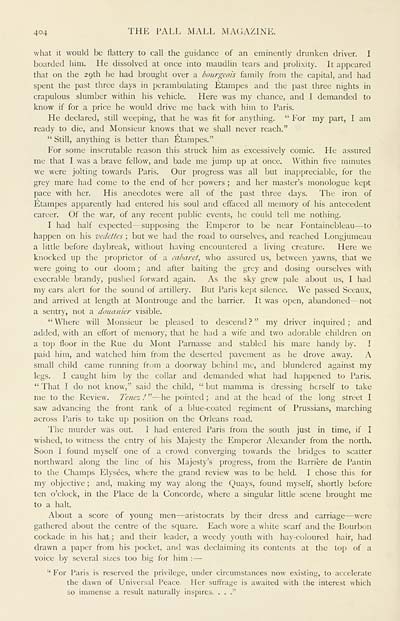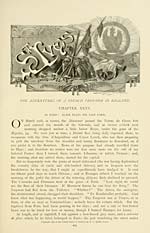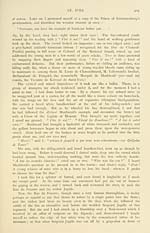Fiction > Serialisations > London, 1896-1897 - St. Ives > Volume 13
(54) Page 404
Download files
Complete book:
Individual page:
Thumbnail gallery: Grid view | List view

404 THE PALL MALL MAGAZINE.
what it would be flattery to call the guidance of an eminently drunken driver. I
boarded him. He dissolved at once into maudlin tears and prolixity. It appeared
that on the 29th he had brought over a bourgeois family from the capital, and had
spent the past three days in perambulating Etampes and the past three nights in
crapulous slumber within his vehicle. Here was my chance, and I demanded to
know if for a price he would drive me back with him to Paris.
He declared, still weeping, that he was fit for anything. " For my part, I am
ready to die, and Monsieur knows that we shall never reach."
" Still, anything is better than Etampes."
For some inscrutable reason this struck him as excessively comic. He assured
me that I was a brave fellow, and bade me jump up at once. Within five minutes
we were jolting towards Paris. Our progress was all but inappreciable, for the
grey mare had come to the end of her powers ; and her master's monologue kept
pace with her. His anecdotes were all of the past three days. The iron of
Etampes apparently had entered his soul and effaced all memory of his antecedent
career. Of the war, of any recent public events, he could tell me nothing.
I had half expected — supposing the Emperor to be near Fontainebleau — to
happen on his vedettes ; but we had the road to ourselves, and reached Longjumeau
a little before daybreak, without having encountered a living creature. Here we
knocked up the proprietor of a cabaret, who assured us, between yawns, that we
were going to our doom ; and after baiting the grey and dosing ourselves with
execrable brandy, pushed forward again. As the sky grew pale about us, I had
my ears alert for the sound of artillery. But Paris kept silence. We passed Sceaux,
and arrived at length at Montrouge and the barrier. It was open, abandoned — not
a sentry, not a douanier visible.
" Where will Monsieur be pleased to descend ? " my driver inquired ; and
added, with an effort of memory, that he had a wife and two adorable children on
a top floor in the Rue du Mont Parnasse and stabled his mare handy by. I
paid him, and watched him from the deserted pavement as he drove away. A
small child came running from a doorway behind me, and blundered against my
legs. I caught him by the collar and demanded what had happened to Paris.
" That I do not know," said the child, " but mamma is dressing herself to take
me to the Review. Tenez I " — he pointed ; and at the head of the long street I
saw advancing the front rank of a blue-coated regiment of Prussians, marching
across Paris to take up position on the Orleans road.
The murder was out. I had entered Paris from the south just in time, if I
wished, to witness the entry of his Majesty the Emperor Alexander from the north.
Soon I found myself one of a crowd converging towards the bridges to scatter
northward along the line of his Majesty's progress, from the Barriere de Pantin
to the Champs Elysees, where the grand review was to be held. I chose this for
my objective; and, making my way along the Quays, found myself, shortly before
ten o'clock, in the Place de la Concorde, where a singular little scene brought me
to a halt.
About a score of young men — aristocrats by their dress and carriage — were
gathered about the centre of the square. Each wore a white scarf and the Bourbon
cockade in his hat ; and their leader, a weedy youth with hay-coloured hair, had
drawn a paper from his pocket, and was declaiming its contents at the top of a
voice by several sizes too big for him : — ■
" For Paris is reserved the privilege, under circumstances now existing, to accelerate
the dawn of Universal Peace. Her suffrage is awaited with the interest which
so immense a result naturally inspires. . . ."
what it would be flattery to call the guidance of an eminently drunken driver. I
boarded him. He dissolved at once into maudlin tears and prolixity. It appeared
that on the 29th he had brought over a bourgeois family from the capital, and had
spent the past three days in perambulating Etampes and the past three nights in
crapulous slumber within his vehicle. Here was my chance, and I demanded to
know if for a price he would drive me back with him to Paris.
He declared, still weeping, that he was fit for anything. " For my part, I am
ready to die, and Monsieur knows that we shall never reach."
" Still, anything is better than Etampes."
For some inscrutable reason this struck him as excessively comic. He assured
me that I was a brave fellow, and bade me jump up at once. Within five minutes
we were jolting towards Paris. Our progress was all but inappreciable, for the
grey mare had come to the end of her powers ; and her master's monologue kept
pace with her. His anecdotes were all of the past three days. The iron of
Etampes apparently had entered his soul and effaced all memory of his antecedent
career. Of the war, of any recent public events, he could tell me nothing.
I had half expected — supposing the Emperor to be near Fontainebleau — to
happen on his vedettes ; but we had the road to ourselves, and reached Longjumeau
a little before daybreak, without having encountered a living creature. Here we
knocked up the proprietor of a cabaret, who assured us, between yawns, that we
were going to our doom ; and after baiting the grey and dosing ourselves with
execrable brandy, pushed forward again. As the sky grew pale about us, I had
my ears alert for the sound of artillery. But Paris kept silence. We passed Sceaux,
and arrived at length at Montrouge and the barrier. It was open, abandoned — not
a sentry, not a douanier visible.
" Where will Monsieur be pleased to descend ? " my driver inquired ; and
added, with an effort of memory, that he had a wife and two adorable children on
a top floor in the Rue du Mont Parnasse and stabled his mare handy by. I
paid him, and watched him from the deserted pavement as he drove away. A
small child came running from a doorway behind me, and blundered against my
legs. I caught him by the collar and demanded what had happened to Paris.
" That I do not know," said the child, " but mamma is dressing herself to take
me to the Review. Tenez I " — he pointed ; and at the head of the long street I
saw advancing the front rank of a blue-coated regiment of Prussians, marching
across Paris to take up position on the Orleans road.
The murder was out. I had entered Paris from the south just in time, if I
wished, to witness the entry of his Majesty the Emperor Alexander from the north.
Soon I found myself one of a crowd converging towards the bridges to scatter
northward along the line of his Majesty's progress, from the Barriere de Pantin
to the Champs Elysees, where the grand review was to be held. I chose this for
my objective; and, making my way along the Quays, found myself, shortly before
ten o'clock, in the Place de la Concorde, where a singular little scene brought me
to a halt.
About a score of young men — aristocrats by their dress and carriage — were
gathered about the centre of the square. Each wore a white scarf and the Bourbon
cockade in his hat ; and their leader, a weedy youth with hay-coloured hair, had
drawn a paper from his pocket, and was declaiming its contents at the top of a
voice by several sizes too big for him : — ■
" For Paris is reserved the privilege, under circumstances now existing, to accelerate
the dawn of Universal Peace. Her suffrage is awaited with the interest which
so immense a result naturally inspires. . . ."
Set display mode to: Large image | Transcription
Images and transcriptions on this page, including medium image downloads, may be used under the Creative Commons Attribution 4.0 International Licence unless otherwise stated. ![]()
| Early editions of Robert Louis Stevenson > Fiction > Serialisations > St. Ives > Volume 13 > (54) Page 404 |
|---|
| Permanent URL | https://digital.nls.uk/81100893 |
|---|
| Description | Volume XIII. September to December 1897. |
|---|---|
| Attribution and copyright: |
|
| Dates / events: |
1897 [Date/event in text] |
|---|
| Form / genre: |
Written and printed matter > Periodicals |
|---|---|
| Dates / events: |
1893-1914 [Date published] |
| Places: |
Europe >
United Kingdom >
England >
Greater London >
London
(inhabited place) [Place published] |
| Subject / content: |
Literature (humanities) |
| Person / organisation: |
George Routledge and Sons [Publisher] Hamilton, Frederic, Lord, 1856-1928 [Editor] |
| Person / organisation: |
Stevenson, Robert Louis, 1850-1894 [Author] |
|---|



